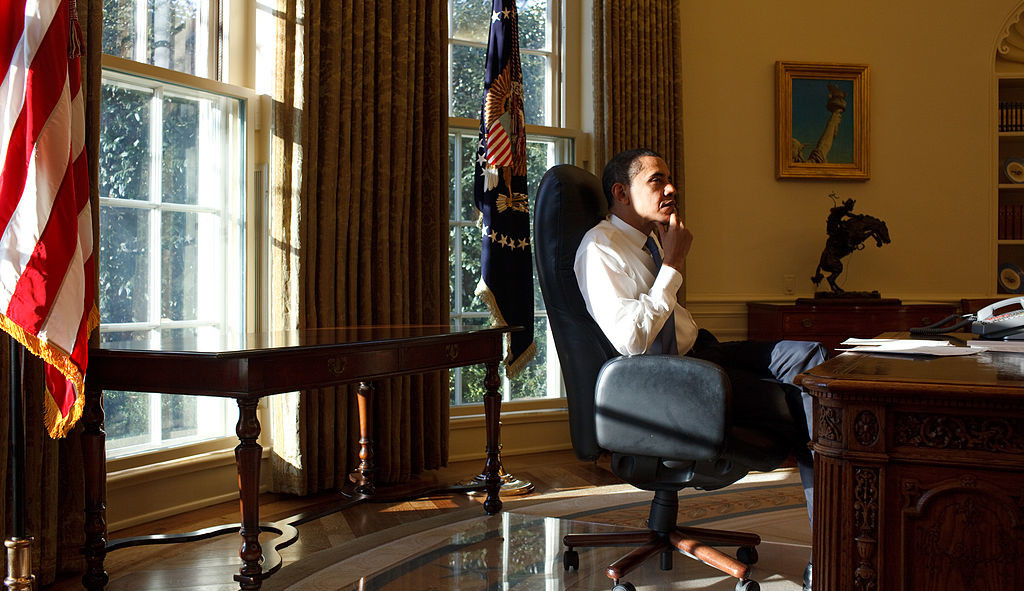One of the themes of a recent New Yorker article about President Obama is what author David Remnick calls “the long view.” Obama compares the presidency to being a “relay swimmer in a river full of rapids, and that river is history.” He notes that only incremental change is usually possible, and it’s up to the long view of history to judge the meaning and effect of those changes. As former Obama adviser David Axelrod notes, “The truth is that history is written over a long period of time—and he will be judged in the long term.”
Some supporters of Obama have been dismayed by a president who seems to already have an eye turned toward his legacy, even as three years of his term remain. Obama’s regular dinners with historians, detailed in Remnick’s piece, don’t provide any comfort to those who express this concern.
As someone who studied history at Brown, I can say that Obama is right. History students are advised against seeing too many patterns or manufacturing narratives. It’s easy to see all of history as marching inexorably toward our present condition. But we – historians, journalists, pretty much everyone – like stories that fit together. We like to believe in purposeful progress, and not a history filled with randomness and dead ends.
Take, for example, the Louisiana Purchase. The 1803 land acquisition that doubled the size of the United States is taught in schools as one event in America’s steady westward expansion, part of the idea of that it was America’s “manifest destiny” to expand to the Pacific Ocean. Historian Frederick Jackson Turner argued in his 1893 “Frontier Thesis” that America’s western frontier was a defining element of the American character. In fact, Jefferson’s purchase of Louisiana from France was mostly driven by the need for commerce to flow through New Orleans, fear of a French presence on America’s western border, and a series of setbacks for Napoleon that left the emperor in a selling mood. Doubtless, Jefferson knew that the Louisiana Purchase was an important historical event, and he surely had an eye on the future of the young country. But Jefferson also fretted about whether it was even constitutional for him to buy Louisiana. The larger narrative of history was not as important as immediate political concerns.
Jefferson’s Louisiana Purchase holds a lesson for Obama as he thinks about the judgment of history: popular history likes to remember big events that fit into larger narratives. Lyndon Johnson is remembered for achievements like the Civil Rights Act, the Voting Rights Act, and Medicare. But LBJ’s presidency is overshadowed by Vietnam. Why? Maybe because the war was the last act of his presidency, maybe because the war affected hundreds of thousands of American families, and maybe because Vietnam fit in with larger narratives of America’s changing status in the world and the rise of ‘60s counterculture. Compared with those narratives, thinking through the complex successes and failures of the civil rights movement and the War on Poverty is difficult.
Even if we don’t yet have “the long view,” is it possible to make some predictions about Obama’s historical legacy? The Obama administration has lacked a severe crisis or scandal that would overshadow his presidency (despite Republican hectoring about Benghazi). The economy seems to be on solid enough footing that Obama won’t be blamed for prolonging the Great Recession, even if he doesn’t receive credit for ending it. The conclusion of the wars in Afghanistan and Iraq is noteworthy, although this will probably be seen by history as inevitable, and Obama took a slow, measured exit to those conflicts. The president’s singular policy achievement is Obamacare, but I would argue that the law is not actually that revolutionary. The law will allow more people access to healthcare, but many of the more fundamental changes (such as in the way doctors and hospitals are paid for patient care) are fairly technical. All of these fairly modest achievements (modest at least in the great scope of history) fit a president known for his cool, logical approach to politics.What then is Obama’s legacy? If partisan gridlock continues in Washington, Obama will be seen as an idealist whose high rhetoric was not able to prevent further partisan fracturing. If the next president is able to preside over a more conciliatory Congress, Obama might be seen more as a victim of backlash to the nation’s first black president. Likewise, if Obamacare does lead to fundamental changes in American healthcare the president will be seen as a reformer, if not, another president who failed to fix healthcare.
More likely, President Obama will be seen as a signal. A signal of the progress of African Americans. A signal of the realignment of America’s foreign policy. A signal of a country that finally began to move on from September 11th, especially with the killing of Osama bin Laden. A signal of an increasingly politically fractured nation. Because Obama (so far) lacks a crippling failure or a resounding policy success, I think this outcome is likely. These symbolic elements of his presidency might overshadow anything President Obama actually did, at least in the long view of history.
